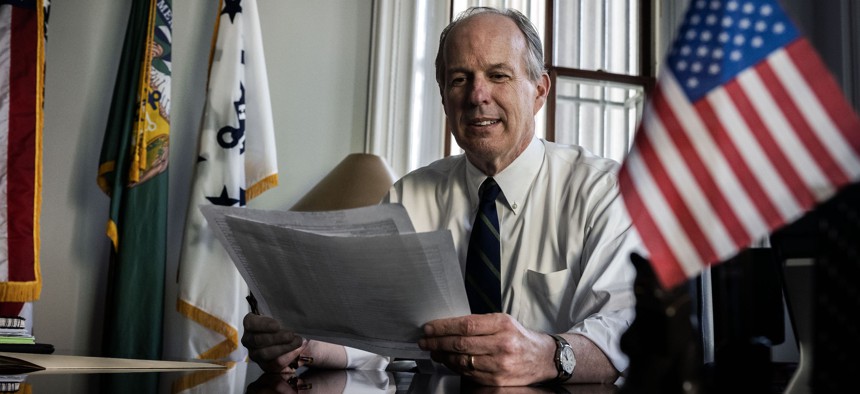The long-time civil servant on the front lines of the default battle

Dave Lebryk in his office at Treasury. Lebryk, a career civil servant, played a key role in tracking the nation's finances ahead of a possible debt ceiling breach. Bill O'Leary/The Washington Post via Getty Images
Dave Lebryk is not widely known to the public but the Treasury official occupies a critical spot when it comes to measuring the daily cash position of the federal government.
Dave Lebryk comes from a family of school teachers in Valparaiso, Indiana, and was the first person ever in his high school to attend Harvard College, where he graduated in 1983 with a major in economics. After two years working at Harvard as an admissions officer and a year with a fellowship to study in Sri Lanka, he went to get a master’s degree at the Kennedy School, where I got to know him when he took my course on operations management in government.
After graduation, he went to work for the Treasury Department as what in those days was still called a presidential management intern. Amazingly, he has stayed at Treasury ever since, over 30 years; he was promoted to the SES in 1996. We have been in touch periodically ever since, and he has counted himself a regular reader of The Lectern (and even tells me he sometimes refers to material from my posts in his public speeches).
In my last column, I wrote about Andrew Vogt of the National Nuclear Safety Administration, another former student who has worked continuously in the federal government since graduation. In all, I have to my knowledge only three long-ago former students who have worked their entire careers as civil servants. (The third is Chantale Wong, currently U.S. ambassador to the Asian Development Bank, whom I will write about in my next post.)
Lebryk’s main jobs over the years have been at main Treasury, though he also served as Acting Director of the U.S. Mint in 2005 and 2006 after originally being hired as deputy director; the Mint is an interesting organization that generates revenues for the government thanks to promoting coins as collectibles. In the early 1990s he worked for a year as a special assistant to Jerome Powell when Powell was undersecretary for domestic finance.
Since 2014 Lebryk has been the fiscal assistant secretary for the Treasury’s Bureau of the Fiscal Service, which was designated as a career rather than political position by Congress several decades ago, the only assistant secretary position at Treasury that is not political. The Bureau manages the daily cash position of the U.S. government and has 3,500 employees. It is in charge of raising money through debt auctions, collecting revenue, and making most government payments such as tax refunds and social security and vendor payments.
Lebryk got a job outside his main Treasury home managing a big grants program to restore the Gulf Coast after the 2010 deepwater horizon oil spill. It was interesting he was given this job though he had no grants experience, and oil spills were way outside his Treasury domain—a good sign of Treasury’s willingness to respect generalized operations management talent. After Covid, Treasury issued 83 million checks to people’s home addresses in eight days and 160 million in a month. During the 2008 financial crisis, getting payments out to people took several months; the improvements are due to a new set of procedures (increased use of direct deposits) and better IT.
One of Lebryk’s main assignments since he came into his current position—again very operational -- has been to merge two units in Treasury, the Financial Management Service and the Bureau of the Public Debt. He states, “Consolidation required persuading OMB, the Congress, and perhaps most importantly, the workforce of the merits of consolidation. Much of my time was setting the new vision and organizational values, and leading a very large change effort.” The combined budget of the new agency is currently less than the budgets of the two original agencies in over ten years ago in 2011.
Lebryk emerged from obscurity due to the recent default brinkmanship. An article in the Washington Post described him as “the man in charge of knowing when the U.S. runs out of money,” personally providing estimates to Treasury Secretary Yellen of the date when the government will actually breach the statutory debt ceiling. Lebryk’s bureau would play a key behind the scenes role in the event of a default, making recommendations to Secretary Yellen about which bills the government should pay and not (despite any default, the government would continue to receive lots of tax revenue and could pay most of its bills).
Lebryk is Polish on both sides of his family, which surprised me since the name doesn’t sound at all Polish to my ears. He says that there are Lebryks in Poland, mostly around Krakow—the town close to Auschwitz where before the Holocaust many Jews lived.
Amazing that Lebryk is in operations, not policy, and that he has stuck around doing this for 30 years. As I said with Andrew Vogt last week, I say “wow.”





